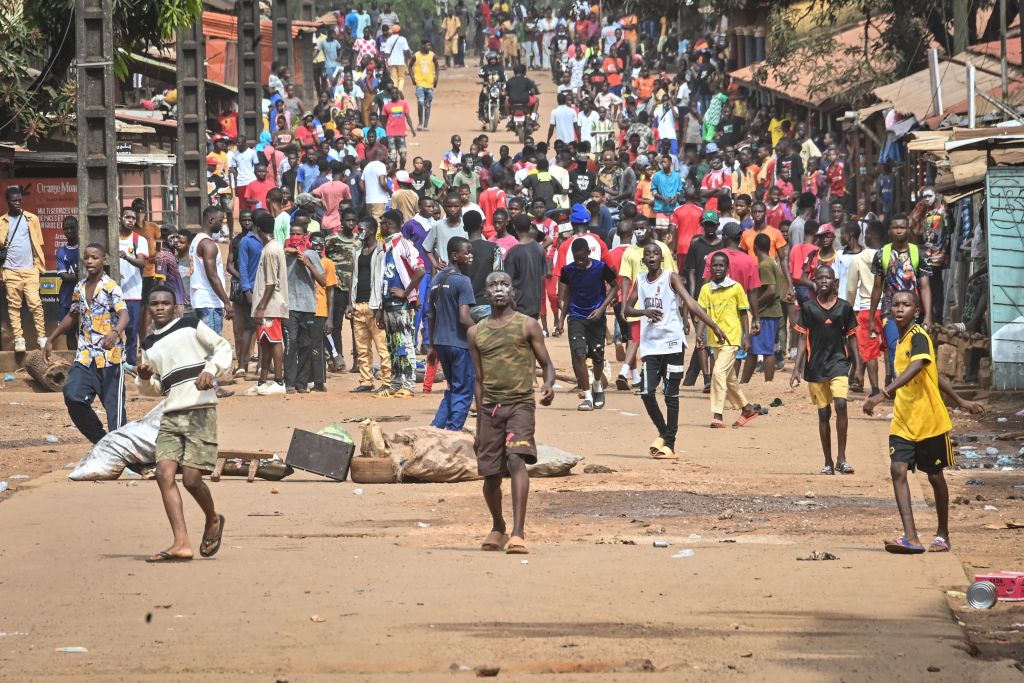Guinea Junta Turns to Military to Face Protesters
ADF STAFF
Less than two years after Guinea’s military seized power from then-President Alpha Condé, the junta is facing a wave of protests.
Violence erupted in the capital of Conakry in May with anti-junta demonstrators throwing stones and burning makeshift barricades and tires. Police opened fire with tear gas and bullets.
More protests were planned for May 17 after organizers reported that seven people were killed and 32 injured on May 10. But when people gathered to rally in the capital, they found Soldiers and armored vehicles waiting.
Minister of Territorial Administration Mory Condé read a statement on national television, calling the demonstrations a “real urban guerrilla war.” He said the protesters “are reigning terror with unprecedented violence” and attacking security forces with “lethal means.”
The transition government threatened to apply anti-terrorist laws that allow life imprisonment for anyone who endangers the lives or freedoms of others with the intention of “intimidating, provoking a situation of terror, creating a feeling of insecurity among the population.” The law also applies to those who sponsor, finance or encourage such acts.
The ruling military has shut down two radio stations, limited access to popular websites and social media, and threatened to close any media that “undermines national unity.”
Advocacy group Reporters Without Borders condemned “a wave of press freedom violations … that is without precedent since the military seized power in September 2021.”
Protests in Conakry have become more common since rising fuel prices sparked unrest in June 2022. Since then, at least 24 people have been killed and dozens arrested, including high-profile activists, according to opposition parties and civil society groups.
Souleymane Bah, a 34-year-old Conakry resident, said people want the military junta to organize elections.
“The military junta can’t give us hope and then act even worse than the regime it replaced,” he told Reuters.
Guinea has been plagued by unrest since Alpha Condé sought a controversial third term in 2020. He was ousted in a September 2021 military coup led by Col. Mamady Doumbouya.
Under international pressure to return power to elected civilians by the end of 2024, Doumbouya’s transition government agreed and said it would enact reforms.
In October 2022, the government cut its transition timeline to two years after the Economic Community of West African States rejected its three-year transitional plan and threatened economic and financial sanctions.
Relations between Doumbouya’s government and opposition parties have since soured, as the junta has banned all demonstrations since 2022, arrested several opposition leaders and taken legal action against others.
Cellou Diallo, leader of the main opposition UFDG party, fled the country to Senegal last year after junta authorities accused him of corruption.
“Three feelings dominate Guineans: weariness, disappointment and disgust at the perjury of Mamady Doumbouya,” Diallo spokesperson Nadia Nahman told Al Jazeera.
“[Doumbouya] was sworn in as president of the transition and pledged to consolidate democratic gains, but he has betrayed all of his commitments with the bloody repression of peaceful demonstrations.”
Recent attempts at dialogue and mediation by religious leaders have failed.
“We have reached a blocking point because we are dealing with a military junta who does not want a dialogue,” UFDG vice-president Aliou Condé told Reuters.
“At this rate, I fear we are heading straight into a wall.”


Comments are closed.